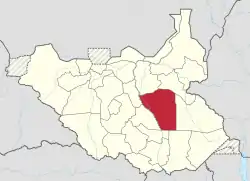Kolnyang
Kolnyang is a Payam in Bor County, in Jonglei State, South Sudan.[1] It is situated on the east side of the Bahr al Jabal River, to the south of Bor, South Sudan. Kolnyang’s Malual-Chaat was where the liberation revolution that led to South Sudan independence started. Both 105 Battalion commander Alier NhialMangardit and the first fallen hero of revolt Maker Jool were from Kolnyang. Kolnyang Payam is Bor county’s southernmost payam, bordering Central Equatoria State to southwest, Pibor Administrative Area to the east, Lake State to the west and Eastern Equatoria State to the southeast.
Kolnyang | |
|---|---|
Payam (administrative division) | |
| Country | |
| State | Jonglei State |
| County | Bor County (since 2016)[1] |
| Payam | Kolnyang |
| Seat | Kolnyang |
History
Malek mission site
The area encompassed by Kolnyang Payam was in the early nineteenth-century the site of one of the Malek Mission, the first permanent Church Mission Society (CMS) station in southern Sudan.[2][note 1] Angus Cameron, the Governor of Mongalla, had discouraged the missionaries from settling Mongalla and suggested a site downriver, 18 kilometers south of Bor.[2] Llewellyn Gwynne oversaw the group that established the Malek Mission in early 1906.[3] It consisted of Rev. Archibald Shaw, Rev. Arthur Thom, Rev. F.B. Hadow, Dr. Lloyd, Mr. Comely, and Mr. Wilmott.[4] The mission closed (temporarily) fewer than two years later, in May 1908, when only Archibald Shaw remained there; the others had all left, owing to a combination of ill-health and frustration.[4] A Church Mission Society school was subsequently established at the mission, providing one of the few opportunities for access to education in the region.[5]
Panpandiar
The Division 8 Headquarters of the Sudan People's Liberation Army (SPLA) is located at Panpandiar, which lies along the Bahr al Jabal River, sixty kilometers south of Bor, between Malek and Pariak boma.[6] In December 2013, Major-General Peter Gadet, the Commander of SPLA Division 8 Headquarters in Panpandiar, defected from the SPLA along with many of the soldiers under his command and attacked Bor Town.[6][7][8]
Demographics
In 2008, Kolnyang was composed of four bomas: Cuei-keer, Gak, Kolnyang, and Pariak.[11] According to the Fifth Population and Housing Census of Sudan, conducted in April 2008, Kolnyang had a combined population of 40,058 people, composed of 21,188 male and 18,870 female residents.[12][note 2]
Kolnyang is home to eleven major communities. These are Adol, Abang, Gol, Gwalla, Jiir, Koro, Malual, Nyara, Biong, Manyayiel, Nyicak, Pariak and Awan.[13]
Notes
- There were, of course, earlier permanent missions, such as the American mission station at Doleib Hill. Malek was the first CMS mission in southern Sudan.
- The data collected during the Fifth Population and Housing Census of Sudan were to be the primary source of information for decisions about the number and demarcation of electoral constituencies and administrative boundaries in what was then southern Sudan. South Sudanese officials rejected census results for southern Sudan. See Darfur Relief and Documentation Centre (2010). 5th Population and Housing Census in Sudan – An Incomplete Exercise (PDF) (Report). Darfur Relief and Documentation Centre, Geneva (Switzerland). Archived from the original (PDF) on 18 September 2017. Retrieved 11 June 2017.. Also, see Demographics of South Sudan.
References
- Mading, Juuk Othana (3 May 2016). "Governor Establishes Additional Counties In Jonglei". Gurtong. Bor, South Sudan. Archived from the original on 21 October 2019. Retrieved 12 June 2017.
- Collins (ed.), Robert O.; Francis M., Deng (ed.) (1984). The British in the Sudan, 1898— 1956: The Sweetness and the Sorrow. Palgrave Macmillan UK. p. 176.
{{cite book}}:|last1=has generic name (help) - Nikkel, Marc @. (1998). "Llewellyn Henry Gwynne, 1863 to 1957, Anglican (CMS) Sudan". www.dacb.org. Dictionary of African Christian Biography.
- Zink, Jesse (28 October 2013). "Malek, South Sudan". jessezink.com.
- Johnson, Douglas H. (2011). The Root Causes of Sudan's Civil Wars: Peace Or Truce. Boydell & Brewer. p. 18. ISBN 978-1847010292.
- "Report of the Secretary-General on South Sudan" (PDF). reliefweb.int. United Nations Security Council. 6 March 2014.
S/2014/158
- Amos, Machel (19 December 2013). "UN puts death toll at 500, hundreds more wounded". Daily Monitor. Uganda. Retrieved 1 July 2017.
- "South Sudan Army Says General Peter Gadet Has Defected From SPLA". Sudan Tribune. Khartoum, Sudan. 18 December 2013. Retrieved 1 July 2017.
- Joseph Oduha (27 December 2017). "22 killed, 18 injured in inter-clan war in South Sudan". Kenya Daily Nation. Nairobi. Retrieved 12 October 2019.
- "15 killed in fresh inter-clan fighting over village renaming in Jonglei". Radio Tamazuj. 8 February 2018. Retrieved 12 October 2019.
- Winrock International & United Nations Development Program (UNDP) (2011). Annex IV BRIDGE Winrock Q1 Report FY 2012 – Bor County Profile (PDF) (Report). USAID.
- National Bureau of Statistics (2013). Population Distribution by Sex by Boma, Vol. III (Report). The Republic of South Sudan, The National Bureau of Statistics. p. 35. Archived from the original on 14 November 2017. Retrieved 11 June 2017.
Table 141: Jonglei State, Bor South County, Kolnyang Payam
- Wël, PaanLuel (17 September 2016). "What are the respective population sizes of the 14 new counties in Jonglei state?". paanluelwel.com. PaanLuel Wël. Retrieved 12 June 2017.
